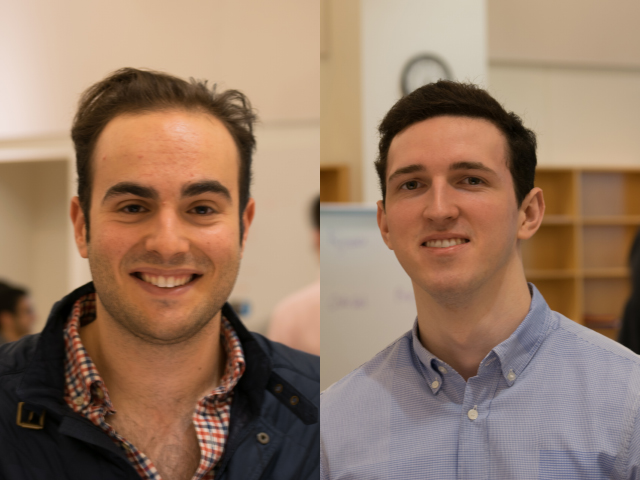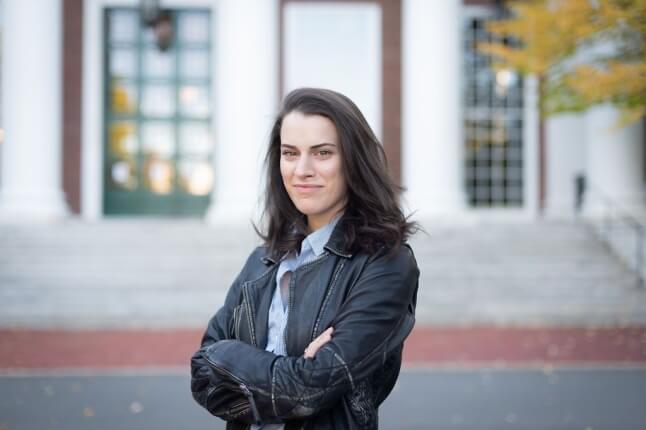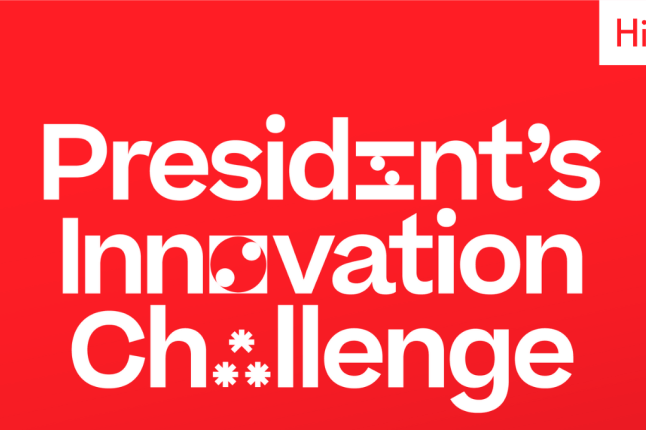News
Doorbell, a community-focused real estate technology platform developed by two Harvard students, encourages apartment residents to meet one another during curated events like this picnic. (Photo provided by Ben Pleat/Doorbell.)
Ben Pleat, A.B. ’17, an economics concentrator, felt a real void when his family moved from their tight-knit, Long Island suburb to a 300-unit apartment building in Manhattan.
“In a way, it was kind of like living inside a shopping mall,” he said. “It was a very anonymous, unfamiliar place where we didn’t know, or even have the chance to meet, a lot of the people living around us. We loved the energy of the city, but that transition was very difficult.”
Pleat shared his frustration with friend and classmate Steven Petteruti, A.B. ’17, an applied math concentrator who also understood the value of community from his childhood in a Providence suburb. The two collaborated to launch Doorbell, a software platform that seeks to infuse any apartment building with a sense of community, while providing convenience and streamlined services for residents and landlords.

Harvard seniors Ben Pleat (left), an economics concentrator, and Steve Petteruti, an applied math concentrator, collaborated to launch community-focused real estate technolog platform Doorbell. (Photo provided by Ben Pleat/Doorbell.)
The Doorbell app, currently available for the iPhone, includes a community feed where residents can post announcements, happenings, or requests to borrow goods and services from neighbors. The platform also enables face-to-face community interaction through curated building events like wine tastings, poker nights, and corn hole tournaments. Doorbell is designed for integration with commercial enterprises, so residents can use the app to redeem special discounts at local businesses. The Doorbell team works with landlords and business owners to establish those “hyper-local” partnerships, Pleat explained.
“Doorbell is an exciting project because we’re not only building out software for residents, but we’re coupling that with real-life interactions,” Petteruti said. “No one is going to use the app if they aren’t primed to by the interactions they have in the building.”
 As they fine-tune the app, Pleat and Petteruti have drawn on the lessons they’ve learned in the John A. Paulson School of Engineering and Applied Sciences course Startup R&D (ES 95r), taught by Paul Bottino, Lecturer in Innovation and Entrepreneurship. That class taught them about human-centered design, and how to create a product customers actually want. To that end, they interviewed more than 20 landlords and hundreds of residents to determine which elements to include in the app. They learned that renters, especially millennial residents, are looking for a differentiated community-driven apartment experience, and property owners are seeking to differentiate apartment communities and retain residents.
As they fine-tune the app, Pleat and Petteruti have drawn on the lessons they’ve learned in the John A. Paulson School of Engineering and Applied Sciences course Startup R&D (ES 95r), taught by Paul Bottino, Lecturer in Innovation and Entrepreneurship. That class taught them about human-centered design, and how to create a product customers actually want. To that end, they interviewed more than 20 landlords and hundreds of residents to determine which elements to include in the app. They learned that renters, especially millennial residents, are looking for a differentiated community-driven apartment experience, and property owners are seeking to differentiate apartment communities and retain residents.
“We found that a ton of the common space that is being built out, as amenities to draw residents into the building, is not being used,” Pleat said. “A space is only as valuable as the people in it. That space becomes even more valuable if it is programmed.”
Thanks to the growing prevalence of the sharing economy, the co-living movement, and the fact that the percentage of people renting is the highest it has been since the 1970s, Doorbell is starting to attract buzz from landlords. The company just inked a deal with a 483-unit apartment complex in Worcester, Mass., and is negotiating with apartment buildings in Boston, Providence, and Washington, D.C. In Worcester, the Doorbell team is working with other stakeholders on a burgeoning urban revitalization project in New England’s second largest city.

This apartment complex in downtown Worcester, Mass. is one of Doorbell's first clients. (Photo provided by Ben Pleat/Doorbell.)
The rapid expansion creates challenges for the two-person team. Many landlords collect rent payments, process maintenance requests, and track occupancy levels using a number of standalone products. As they grow the software platform, the team is scrambling to integrate those tools into the Doorbell system.
As they expand their startup, Pleat and Petteruti remain focused on helping solve the problem of urban isolation, which they see as a potential reality for many of their peers who will graduate this spring. All the more reason to double-down on Doorbell, Pleat said.
“Where will real estate be in 10 or 20 years? How will the apartment building experience change with the introduction of smart cities?” he asked. “These are exciting questions for us to consider. All those huge unknowns fuel our ambitions and drive us to keep innovating.”

Petteruti and Pleat (right) attend a game night at a Worcester, Mass., apartment complex that was organized using the Doorbell platform. (Photo provided by Ben Pleat/Doorbell.)
Topics: Entrepreneurship
Cutting-edge science delivered direct to your inbox.
Join the Harvard SEAS mailing list.
Press Contact
Adam Zewe | 617-496-5878 | azewe@seas.harvard.edu



